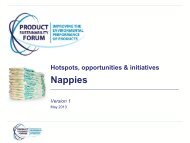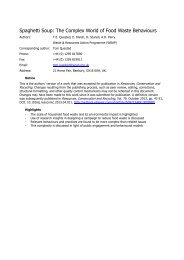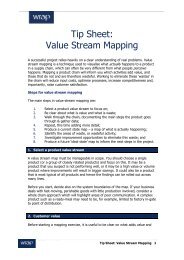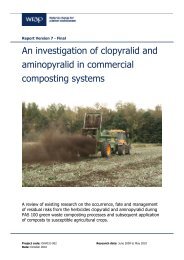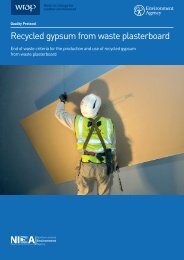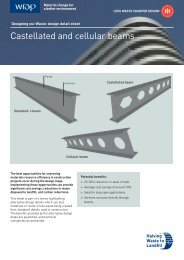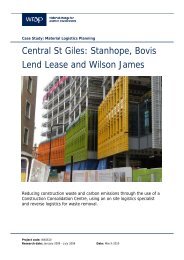Developing a Strategic Approach to Construction Waste
Developing a Strategic Approach to Construction Waste
Developing a Strategic Approach to Construction Waste
You also want an ePaper? Increase the reach of your titles
YUMPU automatically turns print PDFs into web optimized ePapers that Google loves.
Restricted – CommercialAEA/ ED02414/Issue 1<strong>Developing</strong> A <strong>Strategic</strong> <strong>Approach</strong> <strong>to</strong> <strong>Construction</strong> <strong>Waste</strong>The purpose of the Anti-social Behaviour Act 2003 is <strong>to</strong> provide the <strong>to</strong>ols for practitioners andagencies <strong>to</strong> effectively tackle anti-social behaviour. It builds on existing legislation <strong>to</strong> clarify, streamlineand reinforce the powers that are available <strong>to</strong> practitioners. Measures have been designed <strong>to</strong> combat:• Local troublemakers and intimidating groups• Nuisance neighbours• Crack houses• Air weapons and imitation firearms• Graffiti and vandalism• Fly-tipping and litter• Beggars• Abandoned cars• TrespassersImplicationsThe key element of this legislation that affects the construction industry is the development ofFlycapture. This is the national database of fly-tipping incidents that has been set up by Defra, theEnvironment Agency and the Local Government Association <strong>to</strong> get a better picture of the problem ofillegally dumped waste. The information provided will help users develop local enforcement strategiesin partnership with key stakeholders. It will report on the nature and scale of fly-tipping, and thevehicles believed <strong>to</strong> be involved.This new system has now brought fly-tipping more in<strong>to</strong> the public domain, therefore local authoritieshave <strong>to</strong> be seen <strong>to</strong> be doing more <strong>to</strong> combat it. They also have <strong>to</strong> report and record all instances.Managers of construction sites will need <strong>to</strong> ensure their waste is being disposed of properly by theirown company, and by any contrac<strong>to</strong>rs they give waste <strong>to</strong>, or they risk being fined. This could involvesouring new waste contrac<strong>to</strong>rs etc.OverlapsThis will overlap with other legislations which deal with fly-tipping, such as the <strong>Waste</strong> ManagementAct, Clean Neighbourhoods and Environment Act 2005 and Site <strong>Waste</strong> Management Systems whenthe legislation comes in<strong>to</strong> force later this year.OpportunitiesCompanies can be prosecuted on a local level for unlawful tipping as well as through national courts.The industry is therefore under closer scrutiny through local laws.Clean Neighbourhoods And Environment Act 2005SummaryThe Clean Neighbourhoods and Environment Act 2005 contains a variety of environmental measures,including changes <strong>to</strong> the system of recycling credits.This legislation also deals with fly-tipping, and introduces <strong>to</strong>ugher penalties for this. Under this,employees are no longer able <strong>to</strong> use the excuse of working under their employers’ instructions ifcaught fly tipping. The court may also order the accused <strong>to</strong> pay for the costs of cleaning the land, andalso the Environment Agency’s and waste collection authority’s costs. Any vehicles suspected of beinginvolved in fly tipping may be seized.ImplicationsIt is now the responsibility of everyone working in the construction industry <strong>to</strong> ensure all waste isdisposed of properly. All employees will need <strong>to</strong> be made aware that if they are tasked with wastedisposal this must be carried out in accordance with the law, or they risk being fined and having theirvehicles seized.This could involve staff training <strong>to</strong> make sure everyone is aware of the implications of this piece oflegislation.6 AEA Energy & Environment



